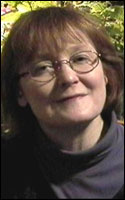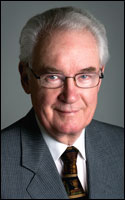Global News Professionals Offer Open-minded Alternatives for American Journalism
Symposium Highlights the Future of Journalism in the Public Interest
Washington, D.C. (April 4, 2008) — Concerns about the future of the press are not just American; they’re global. Some of the solutions emerging from other countries were discussed recently during the joint centennial celebration of the Missouri School of Journalism and the National Press Club in Washington, D.C.
The program, The Next Century: Journalism for a Digital Globe, provided news professionals from Ghana, the United Kingdom, Canada and Sweden with an opportunity to share some of the innovations that offer a promise for the next 100 years.
The four panelists were well aware that their ideas were far from conventional wisdom in the United States, noted Geneva Overholser, the Curtis B. Hurley Chair in Public Affairs Reporting at the School and the program’s moderator.
“We so seldom mine the rich troves of experience available to us in other countries,” Overholser said. “Here are experiences that are enabling newspapers to stay healthy, fostering better understanding of media in the public and enabling citizens to connect more effectively with their government. It was exhilarating to hear success stories like these.”
Excerpts from the presentation are included below.

“Media literacy is a cornerstone for effective citizenship in the 21st century.”
Liss Jeffrey, director of the McLuhan Global Research Network in Toronto, Canada
In her comments about mandatory media literacy class, Liss Jeffrey noted, “In Canada you don’t make the assumption that you do or CAN control the media environment. Why? Because we not only have Canadian channels but we have all the U.S. channels…it’s just not a possibility. You don’t go to the FCC and say, ‘BAN those wardrobe malfunctions’… That’s just not the way it works. … So the idea was: What we need to do is … train those students who are citizens-to-be in how to think critically about any environment that they may run across.”
Jeffrey said that media literacy – despite being viewed here as a “subtly subversive” topic – succeeded in gaining a constituency in Canada because its proponents were not “simply standing up” and lobbing charges about “a toxic environment” or left- or right-wing media, but rather saying, “We need to think critically about … the environment where we live as unconsciously as the fish in water. But we want to encourage students to appreciate some of the great creativity involved in making media … as well as some of the challenges, whether they be commercial, or whatever.”
Media literacy means “training citizens and not only consumers – it’s a little bit of both,” she said. And the more complex and controversial the issue, the more evident the need for media literacy. “It’s harder here in the U.S. to have that encouragement for a genuine debate – that I can sit there and listen to an idea I disagree with — to be able to listen and appreciate and critically analyze all sort of ideas.”
Media literacy may have grown up most vigorously first in Canada “by geographic accident .. but I think now this is simply a global reality, and I do think that education about media is a very important avenue,” Jeffrey said.

“The things I have been describing are too threatening to the conventional ownership and editorship of companies.”
Alan Rusbridger, editor of The Guardian, United Kingdom
Alan Rusbridger’s story was not so much unwelcome to Americans, as it was unusual: a news medium that is growing rapidly – and attributes its success to its focus on substantial news. The Guardian, long the No. 1 online newspaper in the United Kingdom, has also “acquired about 6 million unique users in North America since 9/11, basically, and that’s without spending a cent on marketing,” said Rusbridger. “About a third of our 20 million uniques a month come from North America.”
And why is the Guardian doing so well here? “I hope the answer is that there is something internationalist about the Guardian that you don’t get from some mainstream American outlets.” He added: “I think The New York Times putting its columnists behind a firewall was brilliant for us.”
The Guardian is noted as well for its emphasis on transparency, with a strong ombudsman, a tradition of internal challenge by its columnists, a strong reader-comment site and an annual audit of the company’s behavior, from its carbon imprint to its attitude to diversity. “This is uncomfortable stuff,” he noted, yet in the end they opt “for a policy of maximum transparency. We publish it all. It is all available for anyone to read and to hold us accountable to. And I don’t think we could do any of that if we were in conventional ownership … The things I have been describing are too threatening to the conventional ownership and editorship of companies.”
Continuing his thoughts on transparency, Rusbridger said, “I think if you don’t have a proprietor, you can be much more open about what you do, and I think in the world in which we exist today that is right and it’s also unavoidable. I think the Internet exists as a giant goldfish bowl which will scrutinize everything we do. So I think you have a choice of either doing this to yourself and allowing that conversation in or just sitting there and waiting for it to be done to you.”
Rusbridger shared his thoughts on ownership that places profit-making below other values: “My feeling at the moment is that the world is a very interesting place and is highly connected with our lives, and that the readers understand this. And that at a time when most American papers are withdrawing from the world and closing down foreign bureaus, the Guardian ought to be swimming against the tide and opening up foreign bureaus … That’s the kind of conversation I can have with the Scott Trust. I don’t have to go and argue about the money … or try to make a financial case for it.”
“I can tell you it’s a wonderful place to work. And I feel entirely optimistic about the future of journalism and I know that not many people are. So there may be something … that we’re doing right,” he said.

“I’m going to talk about the forbidden fruit from Sweden … a system of selective subsidies given by the state to newspapers in weak market positions.”
Karl Erik Gustafsson, professor and authority on governmental media subsidies in Sweden
Certainly Karl Erik Gustafsson understood his subject to be anathema to many Americans: “I’m going to talk about the forbidden fruit for you, the forbidden fruit from Sweden and see if you like the taste of that.” Gustafsson outlined a “system of selective subsidies given by the state to newspapers in weak market positions.”
“Due to the subsidies, the newspaper industry has become more healthy than before – more competition, more new initiatives coming on … The government can’t complain, even if you criticize them on the front page every day. It’s only market position [that determines the subsidy],” he said.
“Sweden is a very small country, 9 million people, but it’s a great newspaper nation. Eighty percent of all people men and women alike read a newspaper every day.” Sweden had a strong and early freedom-of-the-press law, said Gustafsson, but was persuaded to adopt the subsidy system after advertising revenues declined and newspapers began to falter. The plan prohibits state interference, he said, and has lasted for 30 years, “So we are not expelled from paradise for tasting the fruit.”
Three categories of media receive subsidies, with No. 2 newspapers in metropolitan markets getting about $10 million each a year, provincial No. 2 newspapers about $2.5 million each and smaller weeklies – such as a Spanish-language newspaper for Latin American immigrants in Sweden – getting about half a million. Comparing the size of the program to an expenditure with which Americans are more familiar, Gustafsson said: “If you take a look at the system, the total budget of the two democratic presidential candidates for president and the [annual] Swedish subsidy for the press is about equal size.”

“We have created a community that is able to impact SO much on public policy, to the extent that we hardly need lobbyists.”
Kojo Oppong-Nkrumah, host with Joy FM, a leading media platform in Ghana
For Kojo Oppong-Nkrumah, government support for media is precisely what his colleagues had to struggle mightily to overcome. Until 16 years ago, he said, Ghana’s only radio was state-sponsored. When Joy FM started in 1995, its chief executive was arrested and locked up. But now his station is part of a thriving media landscape. “In many of our programs we take a critical position on establishment policies, with the hope of causing leadership to better the status quo,” he said.
“In Ghana we don’t have lobbyists. The people who play the role of the lobbyists are the citizens. And they do it through radio. We have managed over the years to build a community – out of the population, we have created a community that is able to impact SO much on public policy, to the extent that we hardly need lobbyists,” noted Oppong-Nkrumah on enabling citizen engagement.
“Our programs … encourage direct interaction between people and government, and careful analysis of issues … so that the ordinary Ghanaian can begin to factor into the public discourse.” Through Joy FM, “the thoughts of the ordinary Ghanaians, in their homes and in their cars and in their offices — go directly to affect government policy through phone calls, text messages, radio and online.” His listeners, he said, tend to be the “working middle class, the kind of people who are working, listening … have weight and authority to speak on the issues – not someone who wants to be cynical about something.” A different kind of talk radio, for sure.
Updated: April 27, 2020